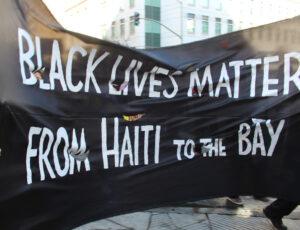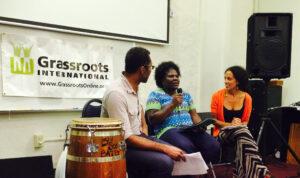Sharing Lessons in the Black Diaspora: Black Women Lead Delegation to Haiti
This week, Black Organizing for Leadership and Dignity (BOLD) and Grassroots International are leading a delegation in Haiti. A group of U.S.-based Black female organizers and activists are travelling the country, meeting with Grassroots International partners and sharing lessons of resistance.
Black women are often sidelined in the history books but have always been out front in movements. Three Black women founded #BlackLivesMatter. Activist Tarana Burke initiated the #MeToo movement against sexual violence in 2006. By bringing together an all-women group for this trip, Grassroots and BOLD hope to further the leadership of Black women organizers in the United States and advance global feminism.
BOLD founder and delegation co-organizer Denise Perry has long recognized how important international solidarity is. Today, building that internationalism has become all the more urgent.
“Our struggles here have to articulate about the world, and not just the continental US,” Denise said. To truly understand and uproot anti-blackness “we have to understand the United States’ role across the world… Haiti is the number one location where we can put those things together.”

Haiti has a long history of resistance and liberation struggles. It was the first nation to free itself from slavery and to create an independent Black republic. Yet European powers, the United States, and Haitian rulers have chipped this freedom away from ordinary Haitians.
“This [delegation] is important,” Denise said. “There’s a lot of experience in Haiti that we could really learn from. We want to be aligned and supporting the Haitian people for liberation as well.”
Yet neither the lessons nor the solidarity head in just one direction. In 2015, Grassroots International worked with #BlackLivesMatter co-founder Opal Tometi and Juslene Tyresias of the Haitian peasant organization Peasant Movement of Papaye (MPP) to host a workshop on internationalism. Juslene later spoke alongside New Orleans activists reflecting on the 10-year and five-year anniversaries of Hurricane Katrina and the Haitian earthquake.

During a speech in Boston, Juslene drew connections between Haiti’s struggles and the Movement for Black Lives in the US:
Haiti was the first Black republic to become independent. For that to happen, there were many values that were necessary. First, there was solidarity within the Black community… We must have unity, we must use solidarity, and we must use our cultural activities so that we can win our rights. Everything is possible if we want it.
Before she returned to Haiti in 2015, Juslene met with Grassroots International and shared her reflections on the trip. She saw a vital need to build deeper, long-term relationships between Haitian social movements and Black organizers in the U.S. This May, she returned to that theme as she relayed her hopes for BOLD and Grassroots’ upcoming visit:
We think this delegation would be a great opportunity, given it’s made up of Afro-descendants, to talk about the issue of migration. As the MPP, we’re a member of La Via Campesina’s Migration Collective, and so there’s been a lot of learning going on there. We intend to share some of those lessons with the delegation. It will be an opportunity to think about migration issues and the plight of Haitians living throughout the Americas.
The delegation is coming. There are other things we’ll start talking about, perhaps opportunities to do more together in the future. But the issues of migration, and racism, and the treatment of Black people globally are what we can start with.
This contingent of Black women organizers is a modest contribution to building these links and joint strategic vision. By meeting face-to-face, transmitting lessons in person, BOLD and Grassroots hope to strengthen this growing internationalism in both countries.
In Denise’s words, “My deepest moments of politicization weren’t from something I necessarily read, but from traveling out of the country, having an experience and being a witness.”
